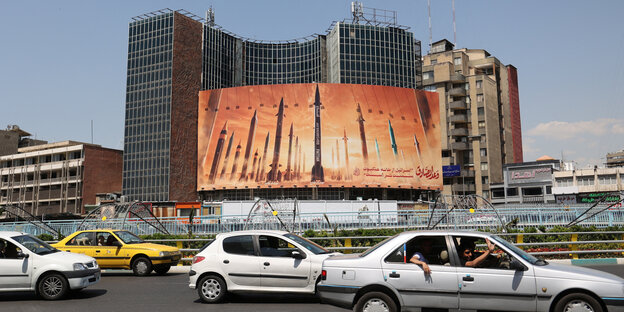Many people in Iran have been worried – and angry with the regime in Tehran – and not just since the recent attack on Israel.

Iran's rulers boast about firing rockets at Israel Photo: Majid Asgaripour/via Reuters
SEDAN taz | When Hamid Moini * thinks about the Iranian regime's attack on Israel last Sunday, he can only scoff. “The regime has made a fool of itself,” he says. Moini is 35 years old and lives in Shiraz. He was one of the many people who took to the streets in 2022 to protest against the Islamic Republic.
“This theater cost us people 500 million dollars,” he adds. He only estimates the amount, but one thing is certain: “As if things weren't bad enough for the people of Iran, the regime continues to steal money to which the population is entitled.” He has done well with the attack but it only showed his own weakness. “The regime is like a barking dog that no one takes seriously.”
In the days after Iran's bombing of Israel and before Israel's military response on Friday, many Iranians are oscillating between cynicism, concern and anger. Many expressed their feelings on social media. “I curse you,” wrote an Iranian from Tehran on Instagram. “We just wanted to live and nothing more, and that is exactly what you tried so hard to take away from us.”
The resistance became so evident that the secret service of the Revolutionary Guard was forced to issue a message calling on “dear compatriots” to inform the authorities about any activity taking place among the population “in support of the false Israeli regime.” . .
The unpleasant regime
In times of war, the population usually supports their own leaders. However, exactly the opposite is happening in Iran. Since the attack on Israel, a large part of the population has openly opposed those in power. Since protests following the assassination of Jina Mahsa Amini were violently suppressed in September 2022, it has become clear that the Iranian regime has the majority of people in its own country against it. Only the most loyal supporters and pressured or paid people show their support for the Islamic Republic.
“Israel, hit the mullahs” is written on the walls of a house in Tehran
Mahdis Amini is 38 years old and lives in the city of Rasht, in northern Iran. When he learned of the attack on Israel, he felt concern and hope at the same time. She and her friends wished that revolutionary leader Ali Khamenei would suffer the same fate as Saddam Hussein. She says of Iranian rulers: “Maybe violence is necessary to make them understand that we don't want them.”
With the collapse of the currency and the renewed increase in violence against women by the moral police, people still do not know how to defend themselves. “Israel should attack their positions,” says the 38-year-old. She does not seem to be the only one who thinks this way: since Sunday, slogans like “Israel, hit the mullahs” have been hanging on the walls of Tehran houses.
Street violence has increased
In fact, violence on the streets of Iran has increased dramatically for some time, even before the recent attack on Israel. The so-called morality police, whose main task is to force the country's women to wear the veil, have been causing serious damage since September 2022. Initially largely removed from the streets after the murder of Jina Mahsa Amini, many women across the country have now taken off the hijab. Estimates suggest that more than half of women are.
“The streets have become a dangerous place,” says Anuscheh Shariati. This 32-year-old woman from Tehran has long since stopped wearing a veil when she leaves the house. “Right now we hardly think about the war with Israel,” she says. “We are completely distracted.” The moral police are currently using more violence against women than in a long time. It seems that those in power in Tehran want to prevent protests from spreading in the country in a precarious foreign policy situation. They take violent measures to avoid it.
Fear of further military escalation remains great in Iran. Mohsen Shariati is 43 years old and lives in Tehran. When news of the attack on Israel reached him, he was driving. He had to stop to calm down, he says. “The first thing I thought was: my son should not see war.”
It's the people who suffer

This text comes from Laborable day. Our left-wing weekly! Every week, wochentaz is about the world as it is and as it could be. A left-wing weekly with a voice, attitude and a special vision of the world. New every Saturday on newsstands and of course by subscription.
The memory of the Iran-Iraq war of 1980 to 1988 is still very present in his generation. The constant fear of bombs and death and the worry that young children will be drafted into war have not been forgotten to this day. Mohsen Shariati is one of those Iranians who are against the Iranian regime, but remain critical of the war in Gaza. According to Shariati, he fears “that now the children of Gaza will also be forgotten.”
It is like any military conflict, with hostility, violence and armed conflict: it is not the political leaders, the dictators and those in power who suffer. It is always and above all the people, everywhere.
* all names changed
